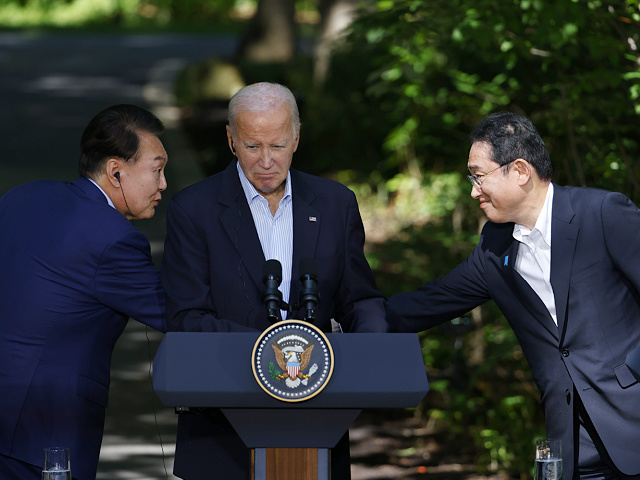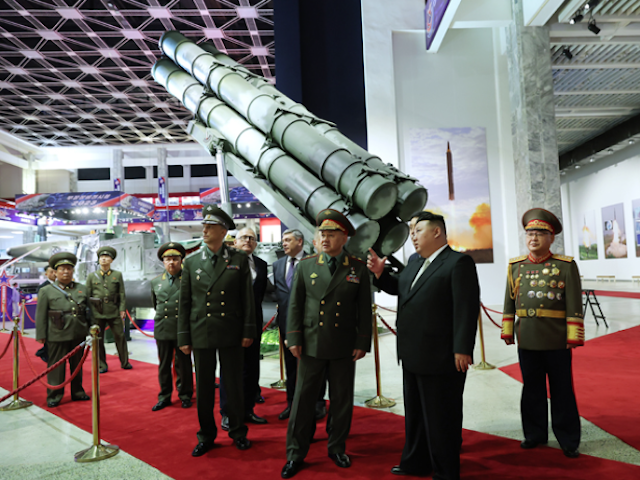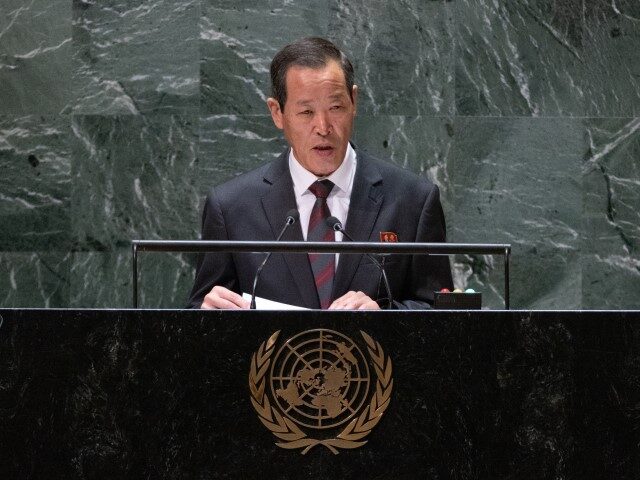North Korea’s ambassador to the United Nations, Kim Song, told the General Assembly on Tuesday that the brutal dictatorship he represents is a helpless victim of “the high-handed and arbitrary practices of some U.N. member states,” especially “the reckless and continued hysteria of nuclear showdown on the part of the U.S. and its following forces.”
Kim bizarrely painted North Korea as a happy land of “progressive” government and dignified people, not the grim authoritarian dystopia of high-living apparatchiks and starving citizens it actually is.
“Providing the people with affluent and civilized living conditions is the supreme principle that governs the activities of the Workers’ Party of Korea and the DPRK government,” he claimed.
Kim gave the regime a pat on the back for supposedly doing a fantastic job of controlling the Wuhan coronavirus “in a stable manner, relying on scientific and transparent anti-epidemic policy and the entire people’s strong unity of voluntary action.”
“Transparent” is the last word any rational outside observer would use to describe North Korea’s coronavirus response. Pyongyang denied it had any coronavirus infections or deaths for much of the pandemic, then eventually admitted to a mere handful of cases, ascribing all other illnesses to an unspecified “fever.”
North Korean state media claimed a total of 74 fatalities from Wuhan coronavirus when they pronounced the epidemic over – a number that would give North Korea the lowest fatality rate in the world, by an order of magnitude.
Apologists for the regime pointed to its shortage of testing equipment for the low number of confirmed infections and fatalities, but that would be nothing for Pyongyang’s U.N. ambassador to brag about at the United Nations, especially given the regime’s exorbitant spending on weapons and nuclear missile development.

This photo provided by the North Korean government shows the test-firing of what it says a Hwasong-17 intercontinental ballistic missile at Pyongyang International Airport in Pyongyang, North Korea, Friday, Nov. 18, 2022. Independent journalists were not given access to cover the event depicted in this image distributed by the North Korean government. (Korean Central News Agency/Korea News Service via AP, File)
Kim was not about to discuss any of that, so he rambled about climate change for a while, the latest in a string of dictators and their representatives to use climate rhetoric as a means of ingratiating themselves with the United Nations.
Kim then laid into the United States, South Korea, Japan, NATO, and everyone else the regime in Pyongyang blames for its troubles:
Owing to the reckless and continued hysteria of nuclear showdown on the part of the U.S. and its following forces, the year 2023 has been recorded as an extremely dangerous year that the military security situation in and around the Korean peninsula was driven closer to the brink of a nuclear war.
From the beginning of the year, the U.S. and the Republic of Korea made hysterical remarks of confrontation such as “end of the regime” and “occupation of Pyongyang” in flagrant violation of the principles and purposes of the UN Charter. They staged largest scale joint military exercises of clearly aggressive nature one after another on our doorstep including the “Freedom Shield”, “Ssangryong”, “Combined Joint Fire Annihilation Drill”, and “Ulchi Freedom Shield”.
After fabricating the so-called “Nuclear Consultative Group” in April committed to the planning, operation and execution of preemptive nuclear strike against the DPRK, the U.S. is now moving on to the practical stage of realizing its sinister intention to provoke a nuclear war by frequently dispatching strategic nuclear submarines and strategic nuclear bombers carrying nuclear weapons in and around the Korean peninsula for the first time in decades.
Kim dismissed the growing “tripartite military alliance” between the U.S., South Korea, and Japan as a sinister American plan to create the “Asian version of NATO,” a bit of rhetoric North Korea imported from its patrons in China. Later, Kim vowed that the actual NATO’s “days are numbered.”
Kim claimed the “current dangerous situation on the Korean peninsula” is entirely “attributable to the U.S. in its attempt to realize its ambition for hegemony by all means,” and railed against South Korean President Yoon Suk-yeol for daring to denounce North Korea’s “just and legitimate measures to enhance national defense capabilities’ in his own U.N. address.
In his speech last Wednesday, Yoon described North Korea’s illegal nuclear missile program as “a direct and existential threat” to South Korea, and “a serious challenge to peace in the Indo-Pacific region and across the globe.”

Fumio Kishida, Japan’s prime minister, from right, US President Joe Biden and Yoon Suk Yeol, South Korea’s president, at a news conference during a trilateral summit at Camp David, Maryland, US, on Friday, Aug. 18, 2023. (Ting Shen/Bloomberg via Getty Images)
Kim, who spat the name of the South Korean government as though it were a fictitious term for a fantasyland, denounced the Republic of Korea as a “puppet government” that has become “a military colony of the U.S., a powder keg of war, and a military outpost” under Yoon’s administration.
The North Korean ambassador sprinkled his speech with not-so-veiled threats, insisting that his government will “further accelerate the build-up of its self-defense capabilities to defend itself impregnably” while Washington and Seoul “drive the situation on the Korean peninsula into actual armed conflict.”

Kim Jong-un and Russian Defense Minister Sergei Shoigu tour a weapons exhibit in Pyongyang, North Korea, June 26, 2023.
Kim railed against the U.N. Security Council for holding meetings on North Korea’s nuclear missile program and human rights violations, dismissing those concerns as “groundless” infringements upon North Korea’s sovereignty.
Kim also howled at the U.N. for supposedly “keeping silence” on Japan’s release of treated wastewater from the Fukushima nuclear facility, when in truth the U.N.’s International Atomic Energy Agency (IAEA) has been deeply involved in the wastewater release plan. The IAEA pronounced Japan’s wastewater discharge plan consistent with international safety standards in July.
Following China’s lead, Kim condemned all human rights sanctions, naming those against Cuba, Syria, Venezuela, and Iran. He denounced U.S. sanctions against Cuba as “economic genocide” and congratulated the Castro regime for “keeping up the banner of socialism invariably in the face of the heinous sanctions, and blockade, and subversive schemes by the U.S.”
After throwing in “support for and solidarity with the Palestinian people” and demanding an independent state for them with “East Quds” as its capital (“Quds” being the Arabic name for Jerusalem), Kim insisted North Korea is eager to do business with “capitalist countries,” provided they “respect our country and are friendly to us.”
“The DPRK will, in the future, forge unity and cooperation with all countries and nations that aspire after independence and love justice while opposing and rejecting aggression, intervention, domination, and subordination, regardless of differences in ideas and systems,” he said.
On Monday, Chinese state media reported that North Korea will begin allowing foreigners to enter the country for the first time since the beginning of the Wuhan coronavirus pandemic.

COMMENTS
Please let us know if you're having issues with commenting.